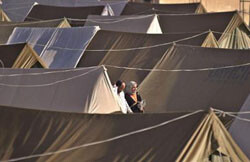American Friends Service Committee 24 July 2003

A couple walks among the tents a refugee camp set up by the UNHCR in Baghdad (Photo: AP/Dario Lopez-Mills, 2003)
As he walked around the Al-Awda Camp, among rows of tents under the scorching July sun, Louay spoke of his family’s former home in Iraq and how he enjoyed his job at a local restaurant. After April 9, 2003, the day Louay and his family were expelled from their home, everything in his life changed. How did Palestinians in Iraq become a people twice-displaced?
The first flight: out of Palestine
In 1948, when the state of Israel was established, more than 5,000 Palestinians fled to Iraq. They came mostly from the cities of Haifa and Jaffa. This group now numbers 35,000 and they were officially registered as refugees by the Iraqi regime of Saddam Hussein. The other 80,000 to 90,000 Palestinians living in Iraq came via Syria, Jordan, Lebanon, and Egypt; they are registered as refugees in those countries. The majority of all Palestinians in Iraq settled in Baghdad, waiting for the day they could return to their homeland.
Iraq is not a signatory to the United Nation’s 1951 Convention relating to the Status of Refugees. However, Palestinian refugees have generally had good relations with the Iraqi people and government. They were given the same rights as Iraqi citizens, with one exception: they could not own land or cars. To partially relieve this restriction, the Hussein regime provided either government-owned housing, or fixed, subsidized rent in privately owned houses and apartments.
The second flight: out of homes, into tents
As the recent U.S.-led war ended, Palestinians in Iraq were left particularly vulnerable, given their uncertain status and the fall of the government that had provided them with housing concessions. More than one thousand families in Baghdad have been expelled or threatened with expulsion, and that number grows daily. Landlords, who no longer receive subsidies from the government for renting to Palestinians, are forcing them out of their homes.
On April 20, 2003, a new Palestinian refugee camp was established, not in Palestine or Jordan, but in Baghdad. The majority of those expelled now live in the Al-Awda Camp. The camp is full of danger. An unexploded bomb lies buried in the middle, too deep (the military says) to be removed. As residents bake in the mid-summer sun, in tents provided by the United Nations Refugee Agency (UNHCR), they must deal with minimal electricity and inadequate water and sewage. Community leaders have petitioned the Occupation Coalition Provisional Authority (OCPA) to identify a building that they can rehabilitate to house the growing number of refugees, but with no success.
“Once again, the catastrophe of 1948 is repeated, as has happened in Lebanon and Jordan, now Iraq,” says Dr. Anwer Salem Al-Awawdeh, director of the Palestine Red Crescent Society in Iraq.
Dr. Al-Awawdeh and Dr. Mohammod Abed Al Wahid, director of the Palestinian Refugee Office in Iraq, are working tirelessly to find new housing for the displaced. Meanwhile, Palestinians in Iraq face other problems.
Occupation forces attacked the Palestinian Embassy during the war and they have occupied it since then. They refuse to return the embassy and its files, and continue to hold three staff members in jail. The civil registry building also was destroyed, along with all of its files.
A desire to go home
The Palestinians’ search for new homes in Iraq does not change what lies at the center of their existence. “We want to return to our country, Palestine,” says Dr. Al-Awawdeh, without hesitation.
U.N. Resolutions 194 and 3236 affirm the right of Palestinians to either return to their homes or be compensated for lost property. Louay echoes Dr. Al-Awawdeh’s sentiments and speaks for Palestinian refugees everywhere when he says, “I have only one thing that I want: Before I die, I want to spend one minute in Palestine… that is all.”